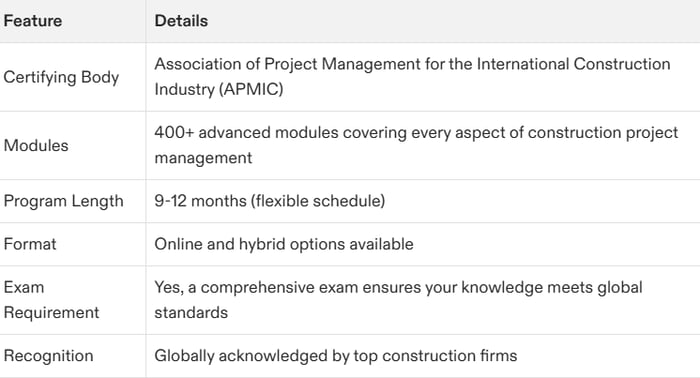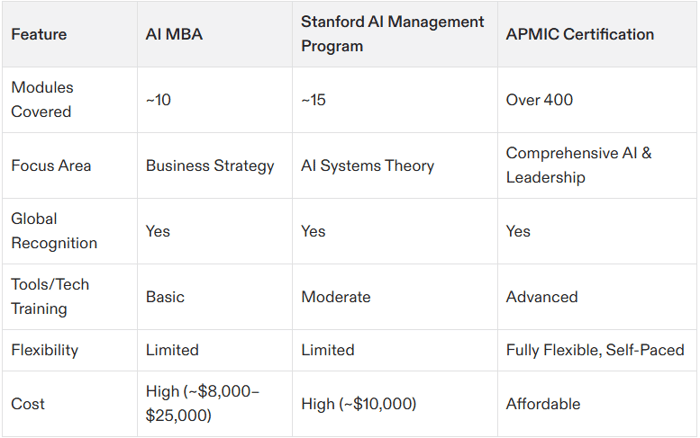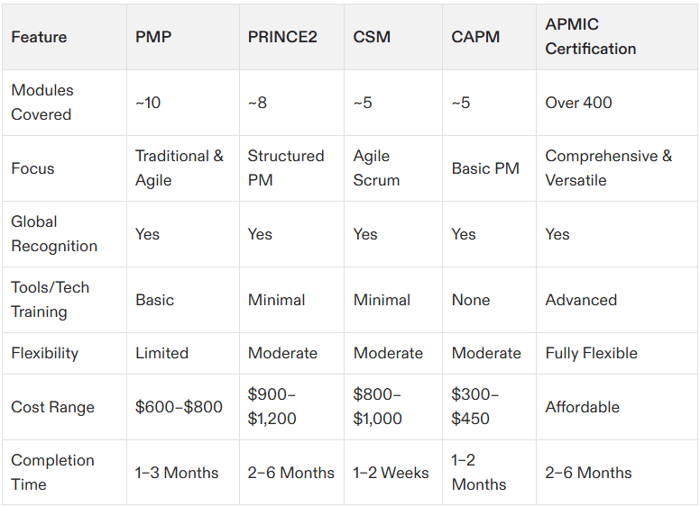Table of Contents
- Why is Project Management Certification for Construction Important?
- Helpful Tips for Securing a Project Management Certification for Construction
- What Does a Project Management Certification for Construction Cover?
- Path to Earning Your Project Management Certification for Construction
- Benefits of APMIC’s Certification Program
- FAQ
- APMIC Certification at a Glance
Are you ready to supercharge your career in construction project management? Gaining a project management certification for construction not only helps you stay ahead in this competitive field but also ensures you're equipped to tackle challenges with confidence and expertise. This comprehensive guide dives deep into why certification matters, what it entails, and how you can get started.
Why is Project Management Certification for Construction Important?
The construction industry is complex, fast-paced, and constantly evolving. Managing projects requires balancing time, budgets, resources, and quality while keeping stakeholders happy. A project management certification for construction demonstrates your proficiency in these critical areas. It verifies that you have the skills to lead a project from inception to completion, ensuring efficiency and success.
Earning a project management certification for construction not only elevates your professional credibility but also positions you as a sought-after expert in an industry that values precision and leadership.
Certified professionals often earn higher salaries, secure better roles, and have the credibility that companies seek when hiring project management experts. It's a career investment that pays off in both knowledge and opportunities.
Helpful Tips for Securing a Project Management Certification for Construction
Choose the Right Certification Program
Not all certifications are equal. Research programs meticulously and prioritize organizations like APMIC that specialize in construction project management. Look for globally recognized certifications with industry-relevant curricula to maximize your career potential.Evaluate the Curriculum
Make sure the program covers critical areas such as risk management, budgeting, scheduling, and compliance specific to construction. The more comprehensive the curriculum (e.g., 400+ modules offered by APMIC), the better prepared you’ll be to handle real-world challenges.Balance Work and Study
Juggling work and certification preparation can be tough. Opt for programs that offer flexible schedules or part-time options. Create a study routine that fits your workday. Dedicate evenings or weekends to coursework without overloading yourself.Leverage Study Resources
Use all available tools like study guides, mock exams, and online resources. Interactive modules and case studies tailored for construction will help bridge the gap between academic concepts and practical applications, ensuring better exam preparation.Engage with Professional Networks
Join forums and attend webinars to learn from experienced professionals. Networking with peers who’ve pursued similar certifications can provide valuable insights, tips, and moral support.Showcase Your Credentials
Once certified, highlight it on your resume, LinkedIn profile, and during interviews. Use it to target lucrative roles like project manager or construction manager. Employers prioritize certified professionals for top-tier roles.Commit to Lifelong Learning
Certifications often require continuing education. Stay current with industry advancements by attending workshops, renewing credentials, or completing supplementary courses.
By choosing the right certification and following these tips, you'll not only gain knowledge but also open doors to career growth in the construction sector.
What Does a Project Management Certification for Construction Cover?
This type of certification equips professionals with tools, techniques, and methodologies designed specifically for the construction sector. Topics include:
- Planning and Scheduling: Structuring timelines and allocating resources.
- Risk Management: Addressing potential issues before they arise.
- Budgeting and Financial Management: Keeping costs under control.
- Health and Safety Compliance: Ensuring a safe jobsite is a top priority.
- Stakeholder Communication: Balancing the needs and expectations of clients and teams.
By mastering these areas, certified individuals can confidently oversee every aspect of large-scale and small-scale construction projects.
Learn more about the certification requirements at APMIC here.
Path to Earning Your Project Management Certification for Construction
Achieving this certification typically involves these steps:
1. Education and Experience
Before enrolling, most programs require a specific amount of professional experience in construction or project management, along with basic educational qualifications.
2. Choose a Trustworthy Certifying Body
Not all certifications are created equal. For the best results, select globally recognized institutions like APMIC, which offers industry-leading certifications with proven credibility.
3. The Application Process
Submit your application, including proof of education/experience, and pay the associated fees.
4. Study the Curriculum
Programs like APMIC’s certification include over 400+ in-depth modules covering modern project management techniques for construction. You'll explore frameworks, practice real-world scenarios, and enhance your leadership abilities.
5. Take the Certification Exam
Once prepared, you’ll be required to pass a rigorous exam to demonstrate your expertise. Comprehensive study resources are available to help candidates succeed.
6. Earn Continuing Education Credits
To maintain your certification status, you’ll need to take periodic courses, ensuring you stay updated on emerging practices.
Start your certification through APMIC today.
Benefits of APMIC’s Certification Program
APMIC (Association of Project Management for the International Construction Industry) stands out for its advanced curriculum that enhances both technical and soft skills. Some key benefits include:
- Global Recognition: Employers worldwide value this certification.
- Customized for Construction Professionals: Unlike generic certifications, APMIC specializes in construction-specific methodologies.
- Adaptiveness to Industry Trends: This program stays ahead of evolving industry technologies and regulations.
With over 400+ modules, the APMIC certification ensures you're skilled in every aspect of project management for construction professionals.
FAQ
Q1. What is the duration of a construction project management certification program?
The duration varies depending on the certifying body. On average, APMIC’s comprehensive program takes 9-12 months when pursued part-time.
Q2. Can I pursue certification while working full-time in construction?
Yes! Many programs, including APMIC’s, are designed with part-time schedules and online classes to accommodate working professionals.
Q3. How much does the certification cost?
Certification costs depend on the provider, but APMIC offers competitive pricing for its top-tier curriculum. Additional exam fees or supplemental materials may apply.
Q4. What industries can I work in after earning this certification?
While tailored for construction, the skills you’ll learn are also applicable in infrastructure, civil engineering, energy, and more. Employers across the board value these qualifications.
Q5. Do I need prior experience before pursuing the certification?
Yes, most programs require candidates to have hands-on work experience in construction or related fields.
APMIC Certification at a Glance
By earning an APMIC project management certification for construction, you join a network of highly-skilled professionals and position yourself for unparalleled career opportunities. Whether you're just starting your career or are an experienced project manager, this certification can be your key to standing out.






